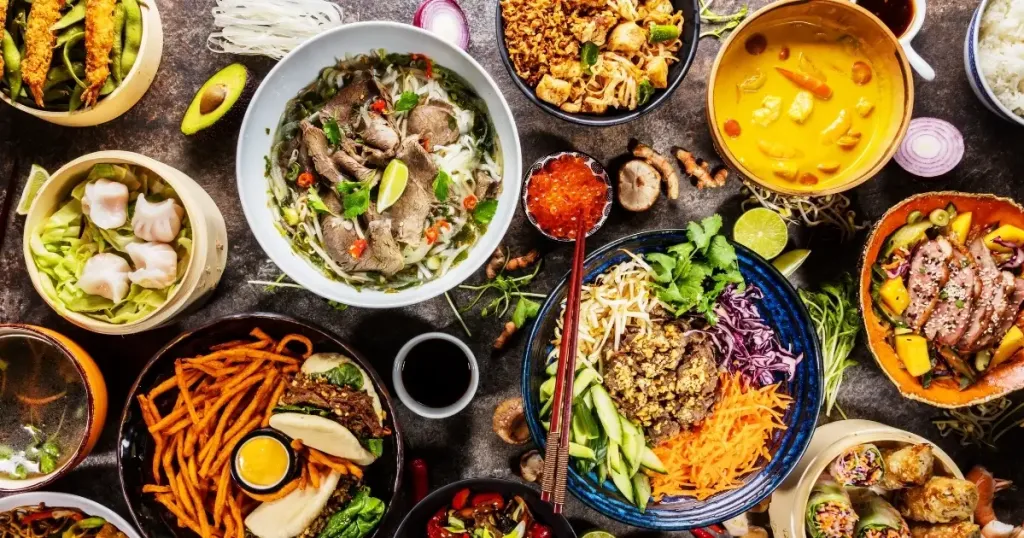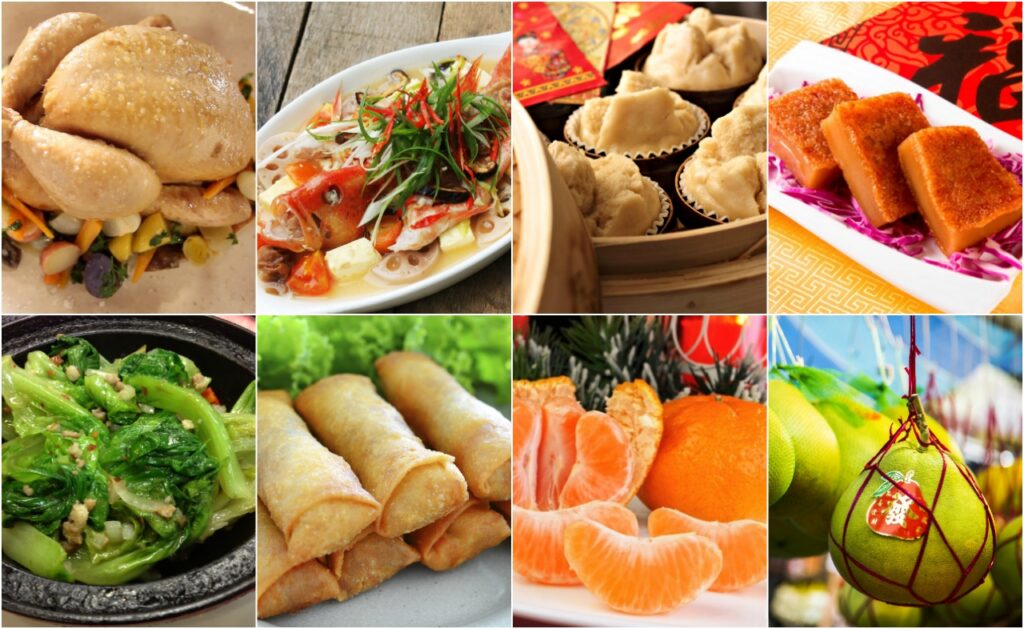Asian wedding are known for their rich cultural traditions and diverse cuisines. The food & drinks served at Asian marriages can vary greatly depending on the specific country, region, and cultural background of the couple and their families. Here are some common elements you might find at an Asian wedding.
Traditional Cuisine:
Asian wedding often features traditional dishes from the couple's cultural background.
Indian Food:
In Indian weddings, you might find a variety of dishes from different regions, such as biryani, curry, samosas, tandoori, and various sweets like gulab jamun and jalebi. Indian weddings typically have elaborate feasts with a wide selection of dishes, catering to the diverse tastes of the guests. The food plays a significant role in bringing joy and celebration to the auspicious occasion of a wedding.
Chinese Food:
Chinese weddings might include a selection of dim sum, Peking duck, seafood, and various noodle dishes. Chinese wedding banquets can be grand affairs with multiple courses, and each dish carries symbolic meaning, representing blessings and well-wishes for the couple's future together. Additionally, the presentation of the dishes is crucial, and the use of vibrant colors and auspicious ingredients is common to bring good fortune to the newlyweds.
Japanese Food:
Japanese weddings may serve sushi, sashimi, tempura, and other traditional Japanese delicacies. Japanese weddings often emphasize seasonal and fresh ingredients, and the presentation of the dishes is equally important as the taste. Each course is carefully selected to showcase the best of Japanese cuisine and create a memorable dining experience for the couple and their guests.

Asian wedding Multiple Courses:
Asian wedding banquets typically consist of multiple courses. Each course may include several dishes, and the meal can be quite elaborate. The banquet usually begins with a selection of appetizers or hors d'oeuvres to whet the guests' appetite. These can include items like dim sum, sushi, samosas, spring rolls, and various small bites. Soups hold a significant place in Asian cuisine, and a flavorful and nourishing soup course is typically served. Examples include hot and sour soup, shark fin soup (traditional in some Chinese weddings), miso soup (Japanese), or a fragrant Indian lentil soup (DAL). The elaborate and diverse nature of these banquets is meant to signify abundance, prosperity, and the importance of sharing good food and happiness with loved ones during this special celebration.

Asian wedding Buffets or Sit-Down Dinners:
Asian weddings may offer either buffet-style meals or sit-down dinners, depending on the couple's preferences and the scale of the wedding. Buffets are a popular choice for Asian weddings, especially when there are many guests. With a buffet, various dishes are displayed on long tables, and guests can serve themselves as they move along the line. The choice between buffet-style meals and sit-down dinners comes down to the couple's vision for their wedding and the overall guest experience they wish to create. Both styles have their unique advantages, and the focus is always on ensuring that guests enjoy delicious food and celebrate the joyous occasion with their loved ones.


Asian Wedding Specialty Drinks:
Specialty drinks are an integral part of Asian weddings, and they often hold cultural significance and are served to symbolize blessings and good fortune. Here are some traditional and specialty drinks commonly found at Asian weddings.
Indian Drinks:
In Indian weddings, you might find lassi (a yogurt-based drink), masala chai (spiced tea), and various fruit juices. Indian weddings place great emphasis on hospitality, and the drink offerings are an important part of the overall dining experience. These traditional Indian beverages add a touch of authenticity and cultural richness to the wedding festivities, ensuring that guests feel welcomed and cherished during this special occasion.
Chinese Drinks:
Chinese weddings may include tea, rice wine, and other traditional Chinese beverages. These traditional Chinese beverages carry deep cultural meanings and are an integral part of the wedding festivities. They are typically served with great care and respect, adding a touch of authenticity and tradition to the joyous occasion of a Chinese wedding.
Japanese Drinks:
Japanese weddings might serve sake and other Japanese alcoholic beverages. That each region and family might have their own preferences and customs when it comes to serving alcoholic beverages at a Japanese wedding. The choice of drinks often reflects the couple's personal tastes and the desire to provide a memorable and enjoyable experience for their guests.

Desserts and Sweets:
A wide variety of desserts and sweets are typically served at Asian weddings. These can include traditional desserts like mochi, rice cakes, kheer (Indian rice pudding). Kheer, also known as payasam or rice pudding, is a beloved Indian dessert made with rice, milk, sugar, and often flavored with cardamom, saffron, or nuts. It is a traditional favorite at weddings and festive occasions. These desserts and sweets represent the cultural heritage and culinary traditions of Asian countries. They are frequently beautifully presented and arranged as part of the wedding feast, inviting guests to savor and enjoy the sweetness of the celebration.

Symbolic Dishes:
Some dishes may hold particular significance and symbolism in Asian cultures. For instance, in Chinese weddings, long noodles symbolize longevity and are typically served. In Chinese culture, long noodles are associated with longevity and a long, prosperous life. In Chinese, Japanese, and some other Asian cultures, serving a whole fish represents abundance and prosperity. These symbolic dishes are thoughtfully chosen to align with cultural beliefs and customs, and they add a deeper layer of meaning to the wedding celebration. They also serve as a beautiful way to honor and respect the cultural heritage of the couple and their families.

That Asian cultures are incredibly diverse, so the specific food and drinks served at an Asian wedding can vary widely depending on the couple's background and preferences. Additionally, in modern times, Asian weddings may also incorporate international cuisine to cater to the tastes of a diverse group of guests.











